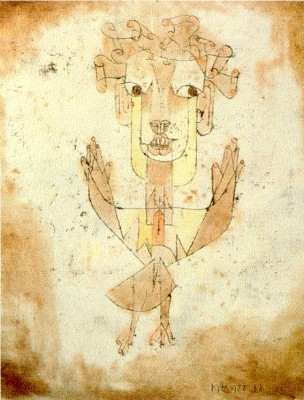 No time (at all)
No time (at all)
Observe:
The angel of history’s wings are spread and he cannot close them and stay, because the storm that blows from Paradise is irresistible. He stares back, astounded, and where we see a succession and a flow of facts and incidents, he sees one single catastrophe, the sole event of all history, which incessantly adds to the pile of ruins and wreckage. Moving away under the violence of the gale, the angel can only contemplate the disaster with horror.
Catastrophe continues to occur, in one and the same cursive time.
Time, Benjamin asserts, is not homogeneous. Or one can only believe it is within a specific representation of time. That representation has been dominant. The struggle against that representation is not merely epistemological, as if it were a matter of replacing a deficient and simple conception with another faithful to the complexity of the temporal phenomenon. It is a political struggle. It is so, because the dominance of the representation that makes time a homogeneous course conditions all the other representations that human beings can make of themselves and of the world that surrounds them, of their becoming and their horizons. It is so, because that conditioning, in turn, determines the manner and ways according to which human beings individually and socially shape their existence.
It is crucial, for you as well (says Benjamin), to engage in this struggle.
The struggle can only take place in the open field of history. This is why it is necessary, above all, to open the field, to destroy the idea and the experience of time as a continuum, as a rosary of facts that succeed one another —little does it matter if they do so causally or by chance. These are always, in their entirety, consummate facts. They are so beforehand, because you only experience and appraise them according to that conception which, in advance, takes the trend of the whole course of history for granted, as if that trend had already been decided in the first of all dissensions.
Opening the field of time, opening history, supposes another experience, another operation with time, which spotlights not the course, but the interruption: that which is unprecedented in a now, in a now-time that carries an electrical charge of tensions, an eye or a lapse in the midst of the hurricane. A now in which every dissension goes back to being unsolved, a now that is not a point of the line or a link of the chain, but a leap: pure immanence. A systole, a beat, the imperceptible moment in which the wings of the angel slightly ruffle and crackle.
There are beats in time, in all time. If you draw your ear closer, you will perhaps sense a secret, stealthy flapping of wings: it is messianic music, the music of hope.
Pablo Oyarzún R.
